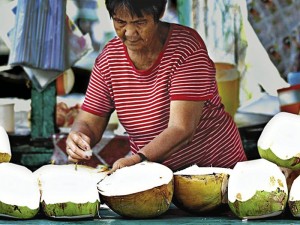MANILA, Philippines–The monthly volume of coconut-based exports jumped 89 percent year on year in August to reach 154,906 tons in copra terms, according to the United Coconut Association of the Philippines (Ucap).
Based on preliminary figures from Ucap, this was the industry’s best monthly performance so far this year. It was also a reversal from a continuous decline recorded in the previous months.
“The figure [for August] is the highest so far recorded this year and reflected the steepest year-on-year increment as well,” the group said in a report.
“Likewise, it bested the monthly average of 107,342 ton for January to April by a whopping 44.3 percent,” the Ucap added citing government figures.
The umbrella group said that for the first time this year, all coconut-based export products except copra meal registered “magnified increases year-on-year.”
Even then, outbound cargos for the eight months to August reached only 940,774 tons, falling 35 percent compared to the level in the same period in 2013.
January to August shipments of coconut oil (CNO) plunged by about 40 percent to 496,323 tons while that of copra meal fell by 48 percent to 309,415 tons.
At the same time, the volume of desiccated coconut exports jumped by 18 percent to 82,170 tons while that of oleochemicals (in copra terms) surged by 21 percent to 25,813 tons.
During the eight-month period, copra exports fell by 9 percent to 106 tons from 116 tons previously.
In August alone, shipments of top dollar earner CNO swelled by more than double at 107 percent to 84,800 tons.
The total already includes unshipped coconut oil in July amounting to 15,000 MT carried over to August.
At the same time, the volume of copra meal exports dived by 32 percent to this year’s lowest so far at 26,533 tons while that of oleochemicals ballooned by 117 percent to 3,050 tons.
Further, desiccated coconut shipments leaped by 11 percent to reach 11,159 tons from 10,043 tons.
Ucap had said that full-year coconut output might drop by about 14 percent to 2.4 million tons after the devastation of millions of trees in the wake of Yolanda as well as Typhoon Pablo in December 2012.
The group said that a shortfall had been anticipated after noting two successive years of increasing output in 2012 and 2013, a usual occurrence in many years in a coconut palm cycle.


